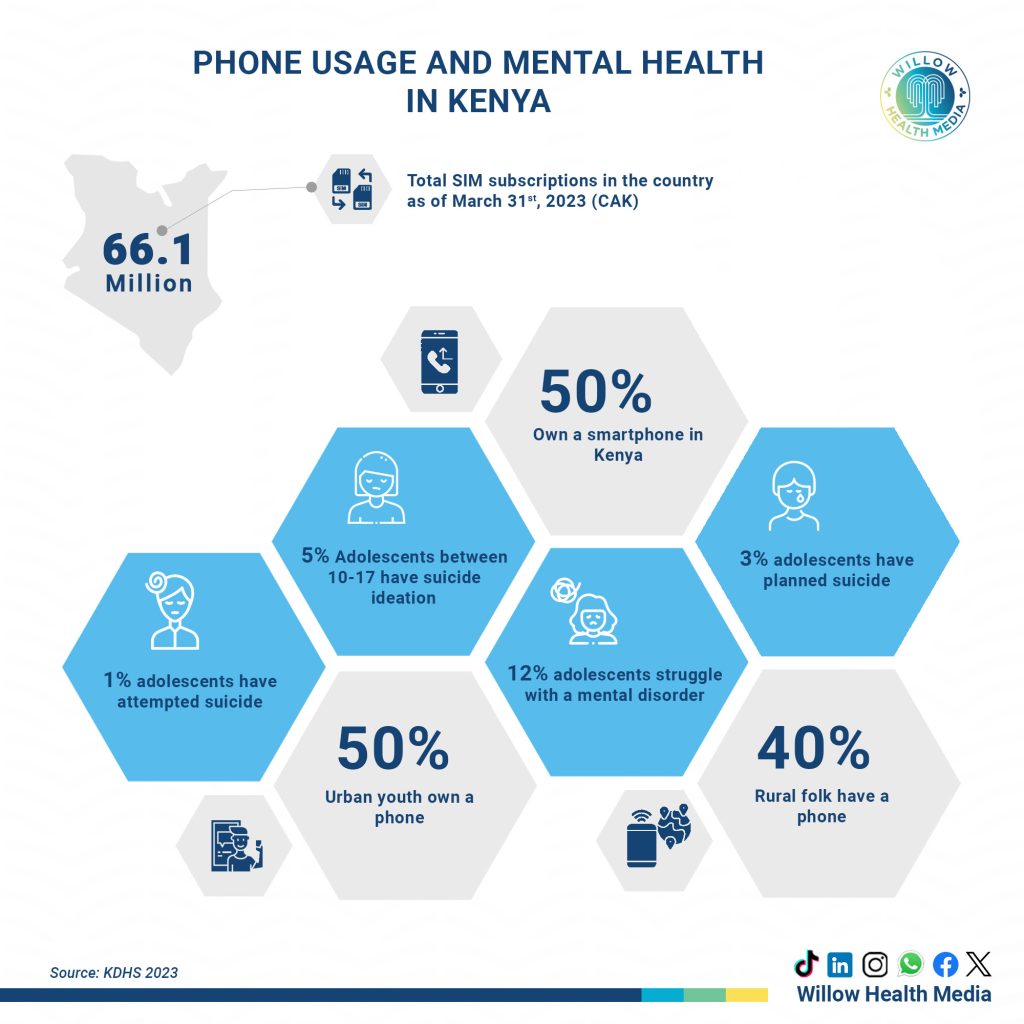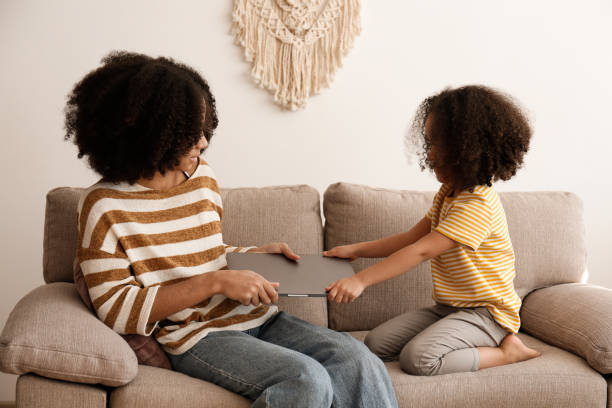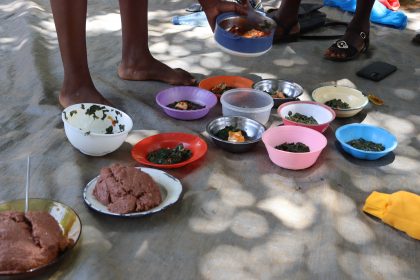Children will lie they have no homework or feign sickness just to skip school and indulge in more screen time – Jacque Gaitho, a clinical psychologist
Martin Obudho’s four-year-old son was so addicted to Minecraft on YouTube he would binge on its videos all day.
Obudho, 38, an audio producer decided to limit his son’s TV time to three hours per day. That was when he realized just how much screen time had altered his son’s personality.
“Whenever TV time ended, he would rage and push things around,” recalls Obudho, who also has an eight-month-old son. “Hell would break loose when it was time to transition to some normal activities like sleep, meals or showers.”
Obudho says his son was exhibiting bouts of “tech tantrums” for which he had to research online for ways of dealing with digital addiction.
“I realize my work is to figure out how to prepare them to be good and functional adults. To achieve that, I immerse myself into whatever they’re watching, to ensure it is not digital junk and violence,” offers Obudho. “When screen time is over, I gently start easing my son off by explaining the importance of other activities like meal time, showering and homework.”
“By helping my son regulate his emotions by seeing the bigger picture, we’ve successfully gotten over digital heroin,” he says, laughing.
Obudho is not alone. There is Emily Fondo whose teenage son loved video games he spent his time at a local movie shop and gaming space. “He always spent money on these games and I would make a fuss,” says Fondo who searched for the benefits of video games.
“I learnt that they helped in hand-eye coordination, typing skills, and even enhancing social interactions,” she says. “I also reasoned the games were better than being on the streets doing something illegal, dangerous, or potentially life-threatening.
Mother and son came up with a solution to help moderate it: “We agreed to keep it to two games a day for one or two hours whenever he’s home on the holidays.”
Unlike Martin and Emily, some parents discover too late that uncontrolled screen time has gained a foothold in their children’s lives.

Sharon Nchaga, a speech and communications therapist, says that too much screen media can affect speech development, as is the case when a child starts to speak with a strange accent or like their favourite cartoon character. Still, in most cases, speech is enhanced among kids who watch kids’ shows.
“Kids’ shows are simple and designed to be highly repetitive, which means children can easily pick up basic vocabulary and sentence structures,” but Nchaga notes that parents need to guide their children on knowledge retention and application.
Jacque Gaitho, a clinical psychologist, explains that “kids will lie they have no homework just to get more screen time. They will lie they’re feeling sick just to skip school and indulge”.
“Other kids end up depending on screen media to help them control their mood. That’s the wrong way to wire a brain. An unhealthy way to cope. Next up, the quick fix will graduate to drug use.”
For teens, there is the danger of idolising celebrity culture and attendant side effects including experimenting with drugs because ‘their idol did it and made it in life.”
Gaitho explains that although some celebrities have positive influences with inspiring lessons, “images of celebrities surrounded by jewellery and sports cars influence children to have a materialistic perspective growing up. This might undermine family values and sustainable forms of wealth.”
Despite the adverse side effects, studies reveal that technology can help foster responsibility, independence, and self-esteem in children.
A 2021 research by Oloo Daniel Ong’ong’a titled “Online Digital Platform Use by Adolescents in Kenya” shows that young people frequently used online platforms at night for entertainment including online gaming, betting, chatting, and streaming content.

While the natural inclination is to ban children from overtly being attached to technological gadgets, Ong’ong’a argues “rather than restrict technology, it makes more sense to teach your child to use technology responsibly.”
He notes that “young people have access to educational, employment and economic opportunities unheard of just a few decades ago.”
There are also educational documentaries for kids that parents can watch as a means of distraction besides access to affordable coding apps and online tech schools for kids and “all parents need to do is commit to implementing positive routines.”
While the pros of tech use among children abound, like a bounty harvest, chaff overflows.
A 2018 survey by “Safe Online, Safe On Land” on Internet use in Kenya among those aged 13 to 19 showed that more than 20 per cent spent their time online accessing inappropriate content and chatting with strangers.
The survey looked at 94 among 300 youngsters rescued from the streets but then attending a school run by the Koinonia Community where 66 per cent used the Internet (78 per cent male, 22 per cent female).
One child said, “They are just social media friends, we discuss anything because they are available even though we have not met.”
The 2023 Kenya Demographic and Health survey reveals that about five in ten people own a smartphone.

Gaitho says the country is undergoing a learning curve as “unfortunately, this is the first generation of parents to deal with such matters. Little insight has been passed down through the generations. The current parents are the trailblazers.”
In rural areas, almost four out of ten people own phones and Gaitho argues that “the effects of technology cut across whether you’re in rural or urban areas” but children in rural areas are spared the vagaries of digital overload due to lack of electricity or easy access to smart mobile phones and they thus “learn from school and their natural environment.”
Gaitho adds that “in urban areas, where space is minimal, children are likely to spend more time exploring the electronics available to them and thus more likely to suffer obesity and brittle bones.”
The opposite is the case in rural areas where they have more space and less access to gadgets and thus are likely to thrive physically.
“Playing outside helps them develop more advanced movement skills than children who spend their time indoors,” explains Gaitho. “They’re more flexible, balanced and coordinated. Kids who play outdoors are more likely to challenge their muscles, bones and physical endurance, contributing to great physical and mental health.”
Dr Bashir Admani, a paediatrician at the Agha Khan clinic says he’s increasingly observed obesity and brittle bones among kids which he links to an indoor lifestyle.
Three decades ago, children’s playtime meant exploring landscapes and innovating toys.
Elizabeth Waithe, the Education Officer with UNICEF, Kenya decries the scarcity of recreational spaces for children which makes life less friendly to play.
The United Nations this year marked June 11 as The International Day of Play and with it, a need to preserve playgrounds and protect them from land grabbers since according to Shaheen Nilofer, the UNICEF representative to Kenya, “slowly by slowly, we’ve seen open parks, open gardens, and spaces have been taken away by new buildings.”






















A good piece on impact of technology on growth of children.
What an eye opener.. as a parent, I’m struggling to find that “perfect balance” where the child can reap the benefits of using gadgets without falling into the abyss of screen addiction.
Excellent writing on current trends in most households, there’s an urgent need to tackle this addiction.